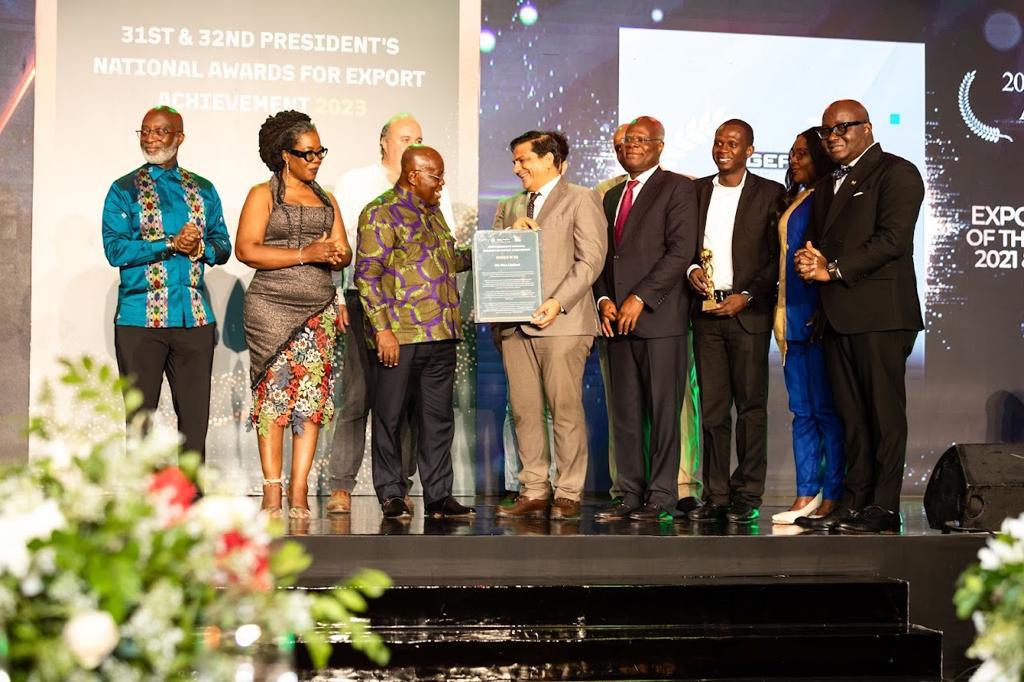
Micro, Small and Medium Enterprises (MSMEs) are pivotal in driving economic growth, fostering innovation and creating employment opportunities in developing countries like Ghana. With their agility, flexibility and ability to adapt to changing market conditions, MSMEs contribute significantly to the country’s GDP and are essential for poverty reduction and sustainable development. They account for about 85% of businesses and contribute around 70% of Ghana’s GDP. However, MSMEs in Ghana face several challenges that constrain their growth and sustainability.
Like many other African nations, Ghana has a vibrant MSME sector comprised of businesses operating in diverse industries; such as agriculture, manufacturing, retail, services and technology. These enterprises range from small-scale family-owned businesses to medium-sized firms with substantial growth potential. Despite their importance, MSMEs in Ghana face numerous challenges that hinder their growth and competitiveness on both the domestic and international fronts.
Key challenges confronting MSMEs in Ghana include limited access to finance, inadequate infrastructure, regulatory constraints, skills shortages and limited market access. Additionally, the COVID-19 pandemic has exacerbated these challenges; highlighting the need for concerted efforts to support MSMEs and strengthen their resilience in the face of economic shocks. Access to finance is a major obstacle, as highlighted by Kwabena Nyarko Otoo of the Trade Unions Congress: “Limited access to reasonably priced credit continues to be one of the most significant constraints for MSMEs in Ghana”. High interest rates, lack of collateral and limited financial records restrict MSMEs from obtaining formal credit to invest and expand.
It must be noted that supporting the growth of MSMEs has a multiplier effect that extends beyond individual businesses to benefit entire economies. As Michael Bloomberg once said: “Small businesses are the backbone of our economy and the cornerstones of our communities”. By creating jobs, fostering economic diversification and reducing poverty, MSMEs play a pivotal role in driving inclusive growth. As Nobel laureate Muhammad Yunus aptly put it: “Entrepreneurship is not just about making money, it’s about creating a better world”.
Furthermore, strengthening supply chains and promoting innovation are essential components of MSME development. As former United Nations Secretary-General Ban Ki-moon emphasised: “Innovation is the central issue in economic prosperity”. By investing in MSMEs, governments and development agencies can unlock new opportunities for growth and development. In the words of World Bank Group President David Malpass: “Supporting small businesses is the key to reducing poverty and promoting shared prosperity in a country”.
Ultimately, investing in MSMEs is not just an economic imperative but also a social and developmental necessity. As the African proverb goes, “If you want to go fast, go alone. If you want to go far, go together”. By working collaboratively to support MSMEs, we can build more resilient, inclusive and prosperous societies for present and future generations.
This article aims at suggesting some economic policy imperatives for the development of MSMEs in Ghana.
Current state of the MSME market:
The current state of MSMEs policy intervention in Ghana is characterised by a fragmented landscape, with various government agencies and development partners running different disjointed models aimed at supporting MSMEs. Agencies such as the National Board for Small Scale Industries (NBSSI), National Entrepreneurship and Innovation Plan (NEIP), National Youth Authority (NYA) and Youth Employment Agency (YEA) are among those implementing initiatives targetting MSMEs. However, the lack of coordination among these entities often leads to duplication of efforts, inefficiencies and gaps in service delivery.
Furthermore, development partners operating in Ghana also target MSMEs with various interventions; but there is often little alignment or coordination with government-led initiatives. This results in a proliferation of programmes and projects targetting the same MSMEs, leading to confusion among stakeholders and a lack of synergy in efforts to support MSME development.
In addition, while banks in Ghana offer tailored financial products for MSMEs, accessing finance remains a significant challenge for many of them. These businesses are often categorised as high-risk due to factors such as limited collateral, informal business practices and volatile market conditions. As a result, MSMEs face high interest rates and stringent lending criteria, which hinder their ability to access the capital needed to grow and expand their operations.
Moreover, there is a lack of dedicated and coordinated ecosystem development that connects all these partners and stakeholders involved in MSME support. The absence of a centralised platform or coordinating body prevents effective collaboration, information sharing and joint decision-making among government agencies, development partners, financial institutions and the MSMEs themselves. This fragmented approach hampers the effectiveness and impact of MSME policy interventions and limits the potential for the MSME sector in Ghana’s holistic and sustainable development.
Ghana Enterprise Authority (GEA), Ghana Development Bank (GDB) and Ghana Eximbank
The Ghana Enterprise Authority (GEA), Ghana Development Bank (GDB) and Ghana Exim Bank (Ghana Exim) each play integral roles in coordinating the ecosystem for Micro, Small and Medium Enterprises (MSMEs) in Ghana. The Ghana Enterprise Authority serves as a central coordinating body, tasked with promoting the development, growth and competitiveness of MSMEs across the country.
Through its strategic initiatives and interventions, the GEA aims to create an enabling environment that supports entrepreneurship, innovation and sustainable economic development. Moreover, the GEA acts as a liaison between MSMEs, government agencies, development partners, financial institutions and other stakeholders, facilitating collaboration, information-sharing and joint decision-making to ensure a cohesive approach to MSME development.
On the other hand, the Ghana Development Bank (GDB) plays a critical role in providing financial support and services tailored to the needs of MSMEs. As a specialised development finance institution, the GDB offers a range of financial products and services; including long-term loans, equity investments and credit guarantees to support MSMEs at various stages of their development. By providing affordable financing and technical assistance, the GDB helps MSMEs overcome the financing gap and access the capital needed to grow and expand their operations. Moreover, the GDB collaborates with other stakeholders, including the GEA and Ghana Exim, to enhance the overall ecosystem for MSME development in Ghana.
Additionally, Ghana Exim Bank (Ghana Exim) plays a crucial role in promoting international trade and exports, thereby expanding market opportunities for Ghanaian MSMEs. Through its trade finance and export development programmes, Ghana Exim provides financing, insurance and advisory services to facilitate trade and investment activities – particularly for MSMEs looking to access global markets. By supporting export-oriented MSMEs, Ghana Exim contributes to economic diversification, job creation and sustainable development in Ghana.
Furthermore, Ghana Exim works closely with the GEA, GDB and other stakeholders to ensure alignment and coordination of efforts aimed at enhancing MSME competitiveness and participation in international trade. Overall, collaboration between the Ghana Enterprise Authority, Ghana Development Bank, Ghana Exim and other stakeholders plays a vital role in coordinating the ecosystem for MSME development in Ghana, driving inclusive growth and prosperity across the country.
Global MSME Architecture
In today’s global economy, Micro, Small, and Medium Enterprises (MSMEs) play a crucial role in driving innovation, creating jobs and fostering economic growth. The global architecture for Micro, Small, and Medium Enterprises (MSMEs) is characterised by diverse initiatives and strategies implemented by countries worldwide to support the growth and development of these businesses.
One noteworthy example is the United States Small Business Administration (SBA), which stands out with its comprehensive approach to supporting small businesses. From counselling and training to accessing capital and disaster assistance, the SBA offers a wide range of services tailored to the diverse needs of MSMEs. This holistic approach not only addresses immediate challenges but also fosters resilience and long-term growth among small businesses. The city and county-level Economic Development Directors also strategise, draw budgets and engage stakeholders on how to develop and arrange innovative finance for these underserved sectors of the economy.
Similarly, in Turkey, the Small and Medium Enterprises Development Organisation (KOSGEB) has made significant strides in strengthening MSME competitiveness. By providing subsidised loans, grants, consultancy services and training, KOSGEB addresses both the financial and non-financial needs of MSMEs. This integrated approach helps enhance the capacity and innovation potential of Turkish MSMEs, positioning them for sustainable growth and global competitiveness.
Meanwhile, Singapore’s Enterprise Development Agency – Enterprise Singapore – stands out for its focus on enhancing SME productivity and competitiveness. Through a combination of financing, infrastructure support, consulting, capability workshops and grants, Singapore offers a comprehensive ecosystem for SME development. By investing in innovation, skills development and technology adoption, Singapore is driving economic growth and positioning SMEs at the forefront of global innovation.
These examples highlight the importance of a holistic approach, tailored interventions and strategic coordination in fostering the growth and development of MSMEs around the world. By drawing inspiration from successful models and adapting best practices to their unique contexts, Ghana can unlock the full potential of MSMEs as engines of economic growth and prosperity.
Why some countries fail in MSME Development
The success or failure of models aimed at promoting the development of Micro, Small and Medium Enterprises (MSMEs) can be attributed to various factors: including contextual relevance, stakeholder engagement, implementation effectiveness and sustainability.
Contextual Relevance: One of the primary reasons why some models succeed while others fail is their alignment with specific context and needs of the MSME sector in a particular country or region. Successful models are typically designed based on an in-depth understanding of the local economic, social and cultural dynamics, as well as the challenges and opportunities faced by MSMEs in that context. Models that fail often overlook or underestimate the unique characteristics and constraints of the target environment, leading to mismatched strategies and ineffective outcomes. What normally happens is that we easily copy MSME models of other jurisdictions without tailoring them to the local environment.
Stakeholder Engagement: The involvement and participation of key stakeholders – including government agencies, development partners, MSMEs themselves, business associations, academia, and civil society organizations – is crucial for the success of MSME development models. Models that actively engage stakeholders in the design, implementation and evaluation processes tend to be more effective in addressing the diverse needs and priorities of the MSME ecosystem. Conversely, models that lack stakeholder buy-in and participation may face resistance, limited adoption and, ultimately, failure.
Implementation Effectiveness: Successful MSME development models are characterised by effective implementation strategies that translate policy directives into concrete actions and tangible outcomes on the ground. This involves clear communication of objectives, efficient allocation of resources, timely execution of activities and robust monitoring and evaluation mechanisms to track progress and address challenges. Models that fail often suffer from poor execution, lack of coordination, inadequate capacity and insufficient resources, leading to limited impact and sustainability.
Sustainability: Sustainable MSME development models are those that promote long-term viability, resilience and self-reliance within the MSME sector. This requires a holistic approach that goes beyond short-term interventions to address underlying structural constraints and build enduring capabilities among MSMEs. Sustainable models focus on enhancing access to finance, strengthening institutional capacity, promoting innovation and technology adoption, improving market linkages and fostering an enabling policy environment for entrepreneurship. Models that fail often neglect these critical elements and rely on temporary fixes or external dependencies, making them vulnerable to instability and discontinuation.
By carefully considering these factors and adopting a holistic approach that addresses the multifaceted challenges facing MSMEs, governments, development partners and other stakeholders can design and implement models that effectively support the growth and prosperity of MSMEs; thereby contributing to inclusive economic development and poverty reduction.
Economic Development Policy
Setting up economic Development Directors
In modern economies, economic development experts play critical roles in the country’s community development agenda. Indeed, MSMEs operate at the local level and require localized solutions to their problems. These directorates play other economic development roles of which entrepreneurship development is one critical factor.
Establishing Economic Development Directorates at the city, district, and regional levels in Ghana holds immense potential for enhancing MSME development. By decentralizing MSME support services, these directorates can tailor policies and interventions to the specific needs of each locality, taking into account local economic conditions, resources, regulations, and opportunities. This localized approach ensures that interventions are relevant, effective, and responsive to the challenges faced by MSMEs at the grassroots level. Moreover, Economic Development Directorates can serve as centralized hubs for coordinating MSME development initiatives within their jurisdictions, facilitating collaboration among relevant stakeholders such as government agencies, development partners, financial institutions, and MSMEs. They are the voice of entrepreneurs at the assembly level. This improved coordination reduces duplication of efforts, promotes synergy, and streamlines service delivery, ultimately enhancing the effectiveness of MSME support programs.
Furthermore, Economic Development Directorates can play a crucial role in promoting local economic development by fostering entrepreneurship, attracting investment, and supporting the growth of MSMEs. By creating a conducive business environment and promoting collaboration between the public and private sectors, these directorates stimulate job creation, income generation, and overall economic prosperity at the local level. Through targeted initiatives such as access to finance, business advisory services, training programs, and market facilitation, MSMEs can benefit from more efficient and targeted assistance, leading to increased productivity, competitiveness, and sustainability. Overall, the establishment of Economic Development Directorates offers a strategic approach to MSME development in Ghana, unlocking the full potential of MSMEs as drivers of economic growth and prosperity across the country.
De-risking the MSME ecosystem
The de-risking of banks by development partners is a pivotal strategy aimed at overcoming the barriers MSMEs face in accessing finance. Through mechanisms such as credit guarantees, development partners share the risk associated with lending to MSMEs, incentivizing banks to extend credit to these businesses. By reducing the perceived risk for lenders, credit guarantees make financing more accessible and affordable for MSMEs, stimulating economic growth, job creation, and poverty reduction. Additionally, development partners provide technical assistance and capacity-building support to banks, strengthening their risk management practices and credit assessment methodologies. This helps build confidence among lenders, encouraging them to increase their exposure to MSME lending and expand their services to this segment of the market, ultimately fostering a more inclusive and resilient financial ecosystem.
Having one major government body for MSMEs
Establishing a unified platform for MSMEs development is paramount for streamlining efforts and maximizing impact. As it stands now, there are multiple lines of support coming from the government, and are not properly coordinated. By consolidating various government agencies, development partners, financial institutions, and MSME stakeholders onto a single platform, the government can facilitate seamless coordination, collaboration, and resource-sharing. It also makes it attractive for patient capital from Venture capitalists, Angel investors, Impact investors, and other private capital to flow into the sector. It is also an incentive for private financiers to route financing through the Banks to support MSME market financing from the Banks. This common platform serves as a centralized hub for disseminating information, delivering support services, and implementing policy initiatives tailored to the diverse needs of MSMEs. Moreover, it promotes transparency, accountability, and efficiency in the delivery of MSME development programs, ensuring that resources are effectively utilized and outcomes are maximized. By fostering synergy and alignment across stakeholders, a unified platform for MSME development enhances the overall effectiveness and sustainability of interventions, ultimately driving inclusive economic growth and prosperity. It is time to empower GEA to play this critical role, devoid of all other competing agencies.
Enhance Regulation
Establishing a rigorous regulatory environment is pivotal for cultivating a conducive atmosphere for the growth of Micro, Small, and Medium Enterprises (MSMEs). Clear and consistent regulations provide a framework that fosters transparency, fairness, and accountability within the market. By ensuring a level playing field, these regulations promote healthy competition and encourage innovation among MSMEs, attracting investment and driving economic growth. Moreover, stringent regulatory standards help build trust and confidence among investors, lenders, and consumers, which are essential for the long-term sustainability and success of MSMEs.
A robust regulatory framework also serves to protect the interests of consumers and stakeholders while safeguarding the integrity of the MSME sector. Through the enforcement of quality standards, consumer protection laws, and fair-trade practices, regulators ensure that MSMEs deliver products and services of high quality and reliability. This not only enhances consumer trust but also bolsters the reputation and competitiveness of MSMEs in the market. Additionally, rigorous regulations help mitigate risks such as fraud and corruption, fostering a culture of compliance and good governance among MSMEs. By promoting transparency, accountability, and ethical behavior, regulators contribute to the resilience and sustainability of MSMEs, enabling them to thrive and contribute positively to economic development.
The Bank of Ghana must make loan defaults punitive enough to attract the involvement of banks in the sector. Some players in the MSME sector default intentionally and making loan defaults punitive enough is crucial for maintaining the integrity of the lending system and incentivizing responsible borrowing behavior among MSMEs. Imposing strict penalties for defaulters, clear guidelines for addressing defaults, and incentives for proactive risk management among lenders could lead to the stability of the system, reduce the banks’ perceived risk, and enhance adequate participation of private capital in the sector.
Common Reporting platforms
Implementing a common MSME finance reporting platform stands as a transformative move for the industry, offering a centralized hub where stakeholders can access standardized financial data efficiently. This platform streamlines reporting practices, ensuring consistency and comparability across MSMEs, financial institutions, regulators, and other players. It is a medium to also access the impact of some specific funds on the MSME market. The enhanced transparency and accountability fostered by this initiative promote trust among investors and lenders, thereby bolstering confidence in the MSME market and attracting much-needed investment. Moreover, the platform facilitates collaboration and information sharing, enabling stakeholders to monitor transactions in real time, detect irregularities, and respond proactively to emerging trends and challenges within the sector. Overall, the adoption of a common finance reporting platform marks a significant step towards strengthening the resilience and sustainability of MSMEs, driving economic growth and prosperity.
By standardizing reporting practices and promoting transparency, a common MSME finance reporting platform fosters a more efficient and collaborative environment for stakeholders in the industry. With streamlined communication and data exchange, stakeholders can assess the financial health and performance of MSMEs more effectively, facilitating faster decision-making processes. More focused research in the sector can thrive. Additionally, the platform serves as a valuable tool for identifying opportunities and addressing challenges within the MSME sector, enabling stakeholders to implement targeted interventions and support programs. Ultimately, the adoption of a common reporting platform not only enhances the credibility and attractiveness of the MSME market but also contributes to its overall development and resilience, paving the way for sustained economic growth and prosperity.
- Deliberate Entrepreneurial Ecosystem Development
The implementation of a deliberate Entrepreneurial Ecosystem development plan by the government signifies a strategic commitment to nurturing a thriving environment for entrepreneurship and innovation. Such a plan encompasses a holistic approach that addresses various aspects critical to fostering the growth and success of entrepreneurs and startups. By focusing on elements like access to finance, infrastructure development, regulatory reforms, skills development, and market access, the government can create an enabling environment where entrepreneurs can thrive and succeed. The YOUSTART concept is a good start towards achieving this aim. However, the ecosystem model must be developed in conjunction with all stakeholders, especially Development partners like JICA, KOICA, GIZ, DFID, USAID, Netherlands Fund, etc. This will ensure that these partners are committed to the plan and that they are in line with their national agenda for the country. Moreover, we cannot exclude collaboration with stakeholders across sectors, including government agencies, industry associations, educational institutions, and the private sector, to leverage collective expertise and resources towards achieving common goals.
Central to the Entrepreneurial Ecosystem development plan is the promotion of innovation, creativity, and risk-taking among entrepreneurs. By fostering a culture of entrepreneurship and providing support mechanisms such as incubators, accelerators, and mentorship programs, the government could encourage the emergence of new ventures and the scaling up of existing ones. Additionally, the plan emphasizes the importance of inclusivity and diversity, ensuring that opportunities for entrepreneurship are accessible to all segments of society, including women, youth, and marginalized communities. Through targeted interventions and strategic investments, the government can stimulate economic growth, job creation, and sustainable development, positioning the country as a hub for innovation and entrepreneurship on the global stage.
- Collaborative market, Service, and Operational support
Developing the right market, technology, and support services for MSMEs in Ghana requires a collaborative effort among various stakeholders, including banks, the Ghana Enterprise Agency (GEA), government agencies, regulators, development partners, and other relevant entities. Firstly, banks play a crucial role in providing financial services tailored to the needs of MSMEs, such as customized loan products, credit guarantees, and financial advisory services. By understanding the unique challenges faced by MSMEs and offering appropriate financial solutions, banks can help bridge the financing gap and support the growth and expansion of these businesses.
Additionally, the Ghana Enterprise Agency (GEA) plays a pivotal role in providing support services to MSMEs, including access to market information, business development training, and mentorship programs. By collaborating with industry stakeholders and leveraging partnerships with development partners, the GEA can enhance its capacity to deliver targeted support services that address the specific needs of MSMEs across various sectors. Moreover, government agencies and regulators play a critical role in creating an enabling regulatory environment that promotes innovation, entrepreneurship, and investment in technology. By implementing policies and regulations that support MSME growth, such as streamlining business registration processes, reducing bureaucratic hurdles, and providing incentives for technology adoption, government agencies and regulators can create a conducive ecosystem for MSME development.
Furthermore, development partners play a vital role in providing technical assistance, capacity-building support, and financial resources to enhance MSME development in Ghana. Through partnerships with local stakeholders, development partners can support initiatives aimed at improving market access, promoting technology adoption, and strengthening the overall competitiveness of MSMEs. By aligning their efforts and resources with the priorities and needs of MSMEs, development partners can maximize their impact and contribute to sustainable economic development in Ghana. Overall, fostering collaboration and synergy among stakeholders is essential for developing the right market, technology, and support services that enable MSMEs to thrive and contribute to economic growth and prosperity in Ghana.
Conclusion:
In conclusion, the development of a vibrant ecosystem for Micro, Small, and Medium Enterprises (MSMEs) in Ghana hinges on collaborative efforts among various stakeholders, bolstered by strategic initiatives such as setting up Economic Development Directorates in all cities, regions, and districts. These directorates would serve as local hubs for coordinating MSME development initiatives, ensuring tailored support and streamlined efforts to address the unique needs of each locality. Moreover, the government’s decision to consolidate all MSME development agencies under the Ghana Enterprise Agency (GEA) marks a significant step towards cohesive and efficient support for MSMEs. By centralizing resources and expertise, the GEA can leverage synergies, eliminate duplication, and optimize service delivery to MSMEs nationwide.
Furthermore, deliberately building the MSME ecosystem with the participation of all development partners onboard is crucial for its sustainability and effectiveness. Collaboration between government agencies, development partners, financial institutions, and MSMEs is essential for fostering innovation, enhancing access to finance, and promoting market linkages. By aligning efforts and resources towards common goals, stakeholders can create an enabling environment where MSMEs can thrive, innovate, and contribute to economic growth. Through sustained collaboration and commitment, Ghana can harness the full potential of its MSME sector, driving prosperity, job creation, and inclusive development across the country.
The writer is a former Head, Public Sector, FBNBank Ghana Limited
The post Enhancing MSMEs: An economic development imperative appeared first on The Business & Financial Times.
Read Full Story




















Facebook
Twitter
Pinterest
Instagram
Google+
YouTube
LinkedIn
RSS